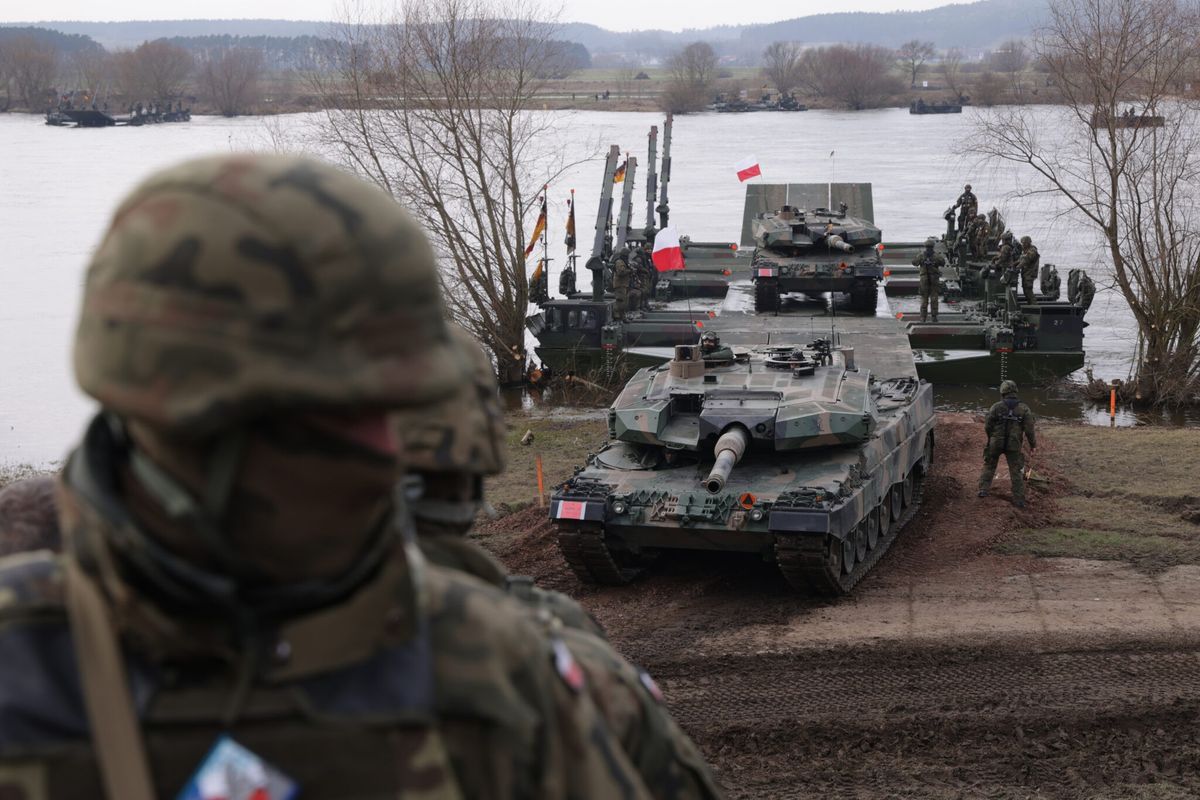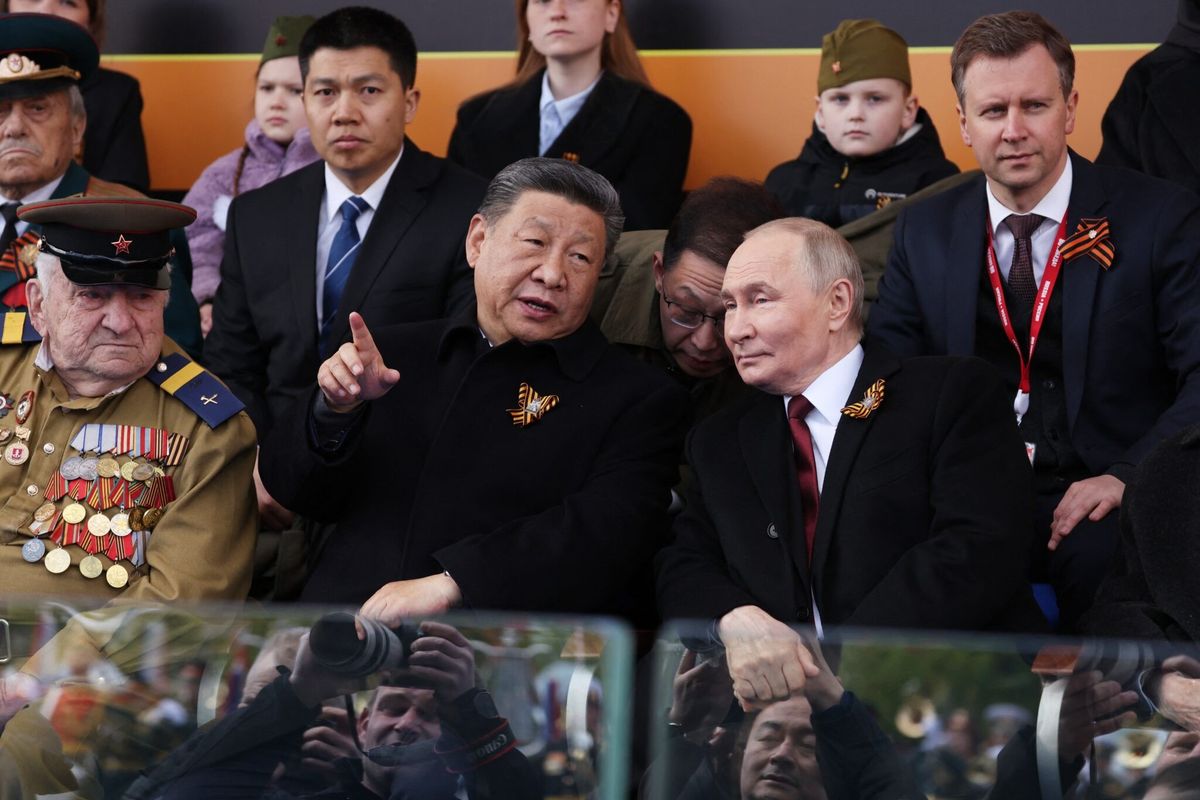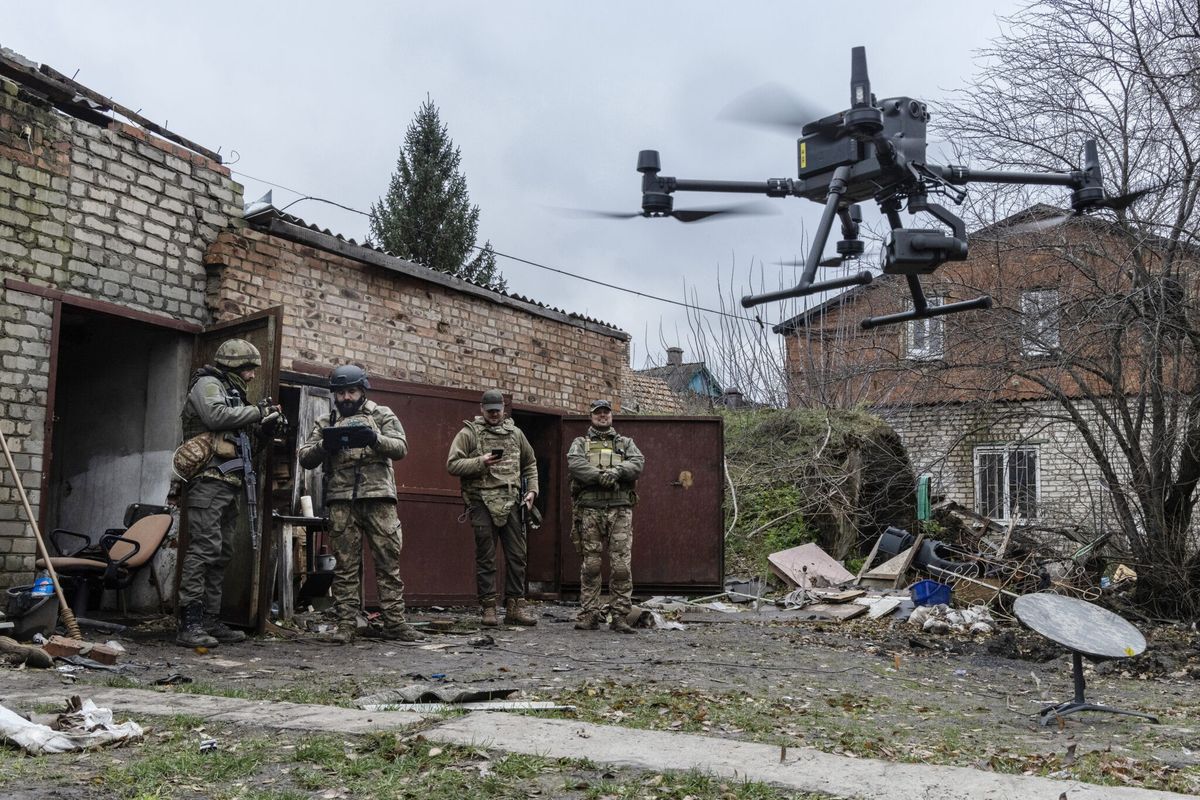SUBSCRIBER+ INTERVIEW - Former Secretary of State Mike Pompeo told The Cipher Brief in a weekend interview that he believes U.S. military aid to Ukraine will continue, because “the vast majority of the American people get” the importance of thwarting Russian aggression, and understand the risk that Russian President Vladimir Putin might attack other European nations if his forces are not stopped in Ukraine.
As The Cipher Brief spoke with former Secretary Pompeo, former President Donald Trump met at his Florida residence with Hungarian Prime Minister Viktor Orban. "He will not give a penny in the Ukraine-Russia war. That is why the war will end," the prime minister said after the meeting with Mr. Trump, who himself has said that he would end the war in Ukraine "within 24 hours" if re-elected president.
As that meeting was happening, Pompeo expressed “confidence” to The Cipher Brief that House Republicans would ultimately agree to the $60.1 billion in funding for Ukraine that House speaker Mike Johnson has thus far refused to bring to the floor for a vote, echoing those Republican holdouts who have linked the Ukraine crisis to the influx of migrants at the U.S.-Mexico border. Pompeo called the situation at the border an “invasion,” which he said was “far more dangerous than what’s taking place anywhere in the world for the American people today” without offering why he believes that.
Asked about U.S. efforts to bring more aid to the people of Gaza, Pompeo said that the welfare of Gazans would improve only when Hamas’ leaders in Gaza were killed.
Pompeo recently returned from a trip to Ukraine, during which he met with business leaders and youth groups. The interview with The Cipher Brief was conducted Saturday. It has been lightly edited for clarity.
The Cipher Brief: You were recently in Ukraine, where the news lately has been difficult including losses to the Russians on the battlefield, and the question of U.S. military support and whether it will continue. What were your main takeaways from your visit?
Pompeo: I’ve been back there now several times since the conflict began, and every day has been difficult since Putin conducted his invasion and aggression against the Ukrainian people. The days that we were there, it was no different from that.
There was uncertainty. They had just had the benefit of the European Union having provided some 50-plus billion Euros in support to them. They were excited about that. They were encouraged to hear the confidence that I continue to have that the United States will continue supporting the Ukrainian effort to get rid of Vladimir Putin’s warriors from their soil, and will continue to be supportive in so many ways.
But Avdiivka had fallen the day we were there as well, and so they were certainly challenged, but I must say - we were with a group of Ukrainian young people, I was giving some remarks in which I mentioned the Soviet Union, and it was almost like, they’d never lived in that, and so they were very much confident that their leadership and their political class and their military was going to be able to ultimately achieve a substantial victory. They were joking that when they hear Putin talking about Ukraine being a part of Russia, for them that is not a lived experience. They were born after the fall of the Soviet Union by a decade in some cases. So this to them looks like what it is - a naked aggression.
The Cipher Brief: Coming back to your confidence that the U.S. will continue to stand with Ukraine, during your trip, you said that you were convinced that support would keep coming. Is that just a general thought, or were you speaking specifically about the bottleneck of aid and do you believe the logjam in the Congress on this will be broken?
Pompeo: I do, but it's worth noting the reasons I believe that. The first being, the vast majority of the American people get it. The vast majority of the American people understand that Ukraine hasn’t asked for a single American soldier, or sailor or airman. They’ve simply said that your traditional role as the arsenal of freedom and democracy is something that we would be great beneficiaries of, and have asked for our continued assistance there. And so that’s one reason I believe it.
The second is, I think as time continues to wear on, the plainness with which the American people can see that the Iranians, the Russians, and the Chinese Communist Party are all working alongside of each other to undermine the central values that we hold dear as Americans, wherever we sit in the political spectrum, I think is something, when I’m out traveling, I think people can see that pretty plainly. And so pushing back against one element of that strain is something that I think the American people will demand that their people do.
And so, yes, there’s always to and fro. The fact of a wide-open southern border, and the absence of a strategy for victory having been articulated by the current president of the United States, makes it very difficult for leaders to express the rationale for taking taxpayer money to support this. I am hopeful that the President will do each of those two things: articulate to the American people consistently, every time he gets the chance, from the Oval Office - you know, the President in the State of the Union talked about earlier conflicts, well, yes, those Presidents got out and explained to the American people why this stuff mattered. And second, I do hope that President Biden will come to see that allowing an invasion on our southern border is far more dangerous than what’s taking place anywhere in the world for the American people today. And the American people know that.
We have to get each of them right. We have to make sure that we support Israel, pushing back against the invasion that took place in their country, we have to support the Ukrainians defending against the invasion that took place in their country, and we have to push back against the tens of thousands of people crossing every month into our nation across our southern border. They are all deeply connected from a national security perspective.
[Ed note: President Biden did ask Republicans during the State of the Union address to approve and send to the White House a bipartisan bill on immigration]
Read Also An Open Letter to House Speaker Mike Johnson by the former Chief of CIA's Central Eurasia Division exclusively in The Cipher Brief
The Cipher Brief: In terms of Ukraine aid, there is a constituency that thinks the war is far away from the United States, that it’s not our fight, and 60 billion dollars is better spent in the United States. What do you say to them?
Pompeo: I begin really with three central ideas. The first being that we made a commitment in 1994 to the Ukrainian people, that if they ever came under attack, the United States would assist them. We shouldn’t forget that. America ought to live up to the commitments that it made.
Second, what happens in Kyiv, doesn’t stay in Kyiv. That’s a little bit of a steal from the Las Vegas convention bureau, but the truth of the matter is, I think that the American people can see that it is no longer the case that there’s this bright line between foreign policy and domestic prosperity. What happens in Kyiv - whether it’s the inability to move red winter wheat around the world, or the security failings that will follow if Ukraine is only the first, Moldova is second, the Baltics follow, I think the American people understand that as well. This impacts their lives as well.
A component of inflation is Joe Biden’s failure to deter the Russians. I had to remind my European friends that I spoke with while I was in Kyiv that this didn’t happen during the Trump Administration. And everybody’s got their theory - blind luck, the good Lord, describe it how you will - but Vladimir Putin, this evil dictator, took a fifth of Ukraine under President Obama. And he refused to provide him with Javelin missiles. And then President Trump came into office and (Putin) didn’t take an inch of Ukraine. And President Biden comes in, and within a matter of weeks (Putin) is preparing to conduct what he calls his “special military operation.” That is not in my judgment coincidental. It is the failure of American leadership. And that impacts the cost of everything for every American’s home. We’re better than that. We’re bigger than that. But it is not far away only. This is going to matter to every American.
The Cipher Brief: We typically don't talk politics at The Cipher Brief, we stick to the national security issues that will impact us all, regardless of political leanings, but Ukraine aid has become such a political issue. If Mr. Trump wins in November, what do you think might change in terms of American policy towards Ukraine and toward Russia?
Pompeo: I don’t view this as remotely political. This isn’t about D’s and R’s. This is about deterrence versus epic failure. 13 Americans killed in Afghanistan. Two wars. This isn’t political for me. As a former soldier, this is deeply about keeping our young men and women alive. We had three Americans killed in the Red Sea a few weeks back. This isn’t remotely political. So I hope you didn’t think I took you to politics. I was taking you to models for deterrence that America has vacillated on. And when we show weakness, the Iranians will continue to take hostages. They have 10 now. We paid $6 billion, got six hostages back, and the Iranians are now holding somewhere in the order of 10 Americans in Gaza today. This was unmentioned in the State of the Union. This isn’t about politics. This is about those families. This is serious stuff.
To your question, I think what we’ll do, what we’ll see if President Trump is elected again, we’ll see the model that we saw for four years. The evidence of willingness of Americans to draw lines and defend them.
(Editor’s note: The Americans were killed at a base in Jordan, not in the Red Sea; Hamas - which is supported by Iran - holds the Americans in Gaza; and the U.S. did not pay $6 billion to Iran. It agreed to a deal to allow Iranian revenues to be moved to the central bank of Qatar, where the funds could be disbursed for humanitarian goods if approved by the U.S. After the October 7 Hamas attacks, the National Security Council said that "Not a single cent from these funds has been spent.”)
The Cipher Brief: In the Middle East, the issue of the moment involves humanitarian aid for Gaza. Do you think the administration should be doing something different to reach the people in Gaza, and to get more aid into the territory?
Pompeo: The administration should be assisting the people in Gaza by reconfirming that Israel must eliminate Hamas. If you want to help Gazan children and you want to save Gazan families, the most direct way to do that is to make sure that (Hamas leader in Gaza Yahya) Sinwar ceases living on the face of the planet.
The Cipher Brief: Looking beyond Gaza, you wrote with former Vice President Mike Pence in The Wall Street Journal that you believe that “devastating strikes” are needed at the moment against Iran, and not just against Iran's proxies in the region but inside Iranian territory. Can you elaborate on that?
Pompeo: It is fundamentally the case that a response to the Iranian killing of Americans - that is, to knock off a knucklehead in Iraq - is an epic failure and won’t deter Iran and will cause escalation. So when Vice President Pence and I carefully chose those words, sometimes people mistake “strike” for kinetic, it’s not necessarily the case. There are many tools of American power, things we’ve done to strike our adversaries in ways that aren’t about ballistic missiles and B-52s. But in the end you have to hold something that the mullahs in Iran value at risk, and today the current administration has chosen a different path. They’ve chosen to sit at the table and negotiate a pathway to a nuclear weapon. And you can see the escalation that has followed from that.
(Editor’s note: Since the January 28 strike that killed three Americans, the U.S. has carried out multiple retaliatory strikes against Iranian proxy militias in Iraq, Syria and Yemen. The Biden Administration is not 'negotiating a pathway to a nuclear weapon' with Iran. That is Mr. Pompeo's personal interpretation of diplomatic efforts to keep Iran from developing a nuclear weapon.)
The Cipher Brief: Actually, just in recent weeks, following American retaliatory strikes, the volume and number of strikes by the Iranians and their proxies have gone down.
Pompeo: I suppose if you pick the right start date you can probably find that. But 200 (strikes by Iranian proxies) since October 7th alone. I won’t disagree that in any given hour, you could say there were more between 12:30 and 12:40 than there were from 12:40 to 12:50. The volume of strikes, the fact that they have now at least $23-24 billion in foreign exchange reserves, which is about 6 or 7 times the amount of foreign exchange reserves that the Iranian regime held at noon on January 20th, 2021 (when the Biden Administration took office), I think suggests that the pathway towards flowing Iranian terrorism has been completely abrogated by this administration.
(Editor's note: According to The International Monetary Fund and World Bank, Iran’s foreign exchange reserves have roughly doubled since late 2020, from a low of $12.4 billion to the current estimate of $24 billion).
The Cipher Brief: You and the Vice President are certainly not alone in calling for strikes on Iranian territory - whatever shape they may take. There are others who worry about the day after. And a conflagration that might follow, in terms of a wider war in the region. Do you share those concerns?
Pompeo: It is certainly the case that one always has to contemplate how escalation may follow from someone’s actions. Our experience, and I think history even before the Trump Administration would suggest, that escalation nearly always follows some element of American appeasement.
I’ll give you two examples. When we moved the (U.S.) embassy (in Israel) from Tel Aviv to Jerusalem, most of the intelligence community and a large piece of the State Department said this will cause World War III, or some proxy thereof. Didn’t happen. The same thing was true when the president made the decision, at my recommendation, or at least with my concurrence, to strike (Revolutionary Guards Corps leader Qassim Suleimani) in Iran. There were large pieces of the national security community both inside our government and outside who said, 'Boy, this will cause a bigger conflagration'. I was fundamentally of the view that it would not. That it would do precisely the opposite. And in fact, I think the data would suggest that we were right about that.
The Cipher Brief: A question about disinformation. How worried are you as a U.S. citizen about disinformation given that it seems to be almost an assumption now, as the presidential campaign begins, that we’re going to be inundated with disinformation campaigns, whatever the national source or domestic source. How worried are you and what do you think can be done about it?
Pompeo: It’s a really important question. I do share the concern that folks articulate that says that with information, if we can’t sort it, we can’t get something that sorts and provides a guidestar for the American people to say, 'Hey, this is truth, this is not spin or worse yet, a complete fake', that the underpinnings of the republic are at risk. I think that’s very, very true.
And your point is very well taken. There is risk of this from nation-state actors that are doing this with great intention, and are pretty sophisticated about pushing disinformation through the pipeline, propaganda, call it what you will. And then there is a second place - which is that, even from folks who are here inside the United States, engaged in this as well, oftentimes supporting some of the same narratives that these nation-state actors are putting forward. There is a real risk.
I am very hopeful that the good work will continue to be done. I credit the Biden Administration in some regards for getting some pieces of this right as well, continuing some of the stuff we did, and frankly doing some of the stuff we did perhaps even a little bit better. You have to make sure you do this, and you have to find a way to do it, and this is of course the trick, you have to do it without suppressing opinion, advocacy, and argument. We need full-throated, wide-open arguments so that the American people can sort out judgments and opinions and do so from a factual predicate that reflects reality. And that is a very difficult problem set.
The Cipher Brief: If called upon, and if he wins, would you serve in another Trump administration?
Pompeo: Yes, sir. If I can have an impact, and someone asks, whoever that may be, 'Hey, can you come help, can you come serve', and I think I can make a difference - I’ve always said “yes,” and no reason to think that I wouldn’t continue do that.
Read more expert-driven national security insights, perspective and analysis in The Cipher Brief
Update: Adding meeting between former President Trump and Hungarian Prime Minister Viktor Orban over the weekend.













